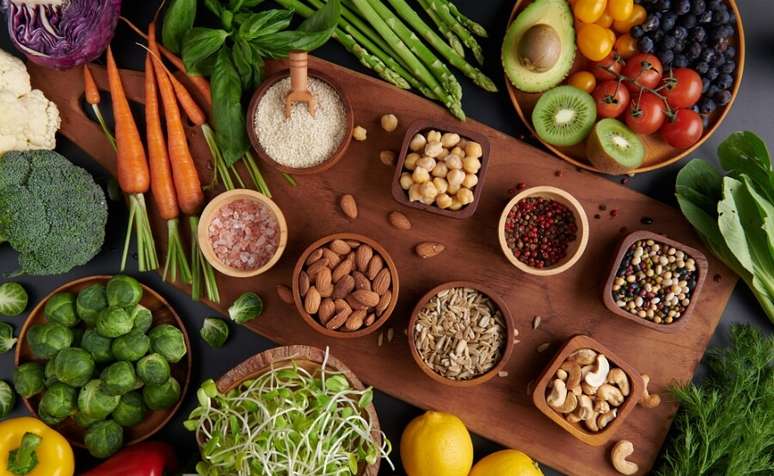The transition to vegetarianism requires nutritional care
The number of people who adopt a vegetarian or vegan diet or simply reduce the consumption of animal products is growing every day. Vegetarians are defined as people who do not eat meat, chicken or fish. Depending on the inclusion or exclusion of animal derivatives, the diet receives a specific definition: ovo-lacto-vegetarian (includes eggs, milk and dairy products), ovo-vegetarian (includes eggs), lacto-vegetarian (includes milk and dairy products), strict vegetarian (does not include products of animal origin) or vegan (excludes products of animal origin in food, hygiene and clothing).
Whether you choose to follow a vegan, vegetarian or flexitarian diet (reduce meat consumption), the benefits for your health are many. Plant-focused diets are naturally high in fiber, low in saturated fat, and sources of phytochemicals, which help reduce the risk of several diseases.
Studies show that vegetarians are 40% less likely to develop cancer than omnivores. Plant-based diets can reduce the risk of heart disease, hypertension, osteoporosis, and type 2 diabetes mellitus.
Nutritional deficiencies
Before adopting a vegetarian diet it is advisable to examine whether there are any nutritional deficiencies. To do this, routine tests should be carried out that include levels of iron, vitamin D, B complex (especially vitamin B12), calcium and iodine.
If a deficiency is present, this must be corrected through the correct combination of foods or dietary supplements and with monitoring by a qualified healthcare professional.
Excluding possible nutritional deficiencies, eliminating the consumption of meat and fish can be immediate.
However, the transition to a vegetarian diet must be tailored to each individual. Some people prefer to eliminate meat overnight, while others prefer a gradual reduction.
The “flexible diet” corresponds to the expectations of people who want a gradual transition. It is a diet based on products of plant origin, with occasional consumption of meat and fish. Those who adopt this practice progressively increase the number of vegetarian meals.
Change eating habits
Taking into account that adapting a vegetarian diet requires a change in eating habits, organization plays an important role. This plan allows you to adopt a balanced diet, which means that it must provide complete proteins, i.e. containing all the essential amino acids, good quality fats (almonds, walnuts, olive oil, avocado), whole carbohydrates (cereals, cereals wholemeal), vitamins and minerals (fruit, vegetables, legumes).
Lacto-ovo vegetarians can easily obtain quality protein through the consumption of eggs and dairy products. For strict vegetarians and vegans, who exclude all foods of animal origin, the challenge is greater, since they must combine different sources of plant proteins throughout the day.
Some sources are: lentils, beans, chickpeas, soy, tofu, tempeh, soy drinks, nuts and seeds. Whole grains and vegetables also provide some protein.
The Academy of Nutrition and Dietetics has stated that a vegetarian or vegan diet can provide all essential nutrients for children, adolescents, adults, pregnant women and breastfeeding mothers. However, getting protein, calcium, iron, vitamin B-12 and omega-3 can be a little more difficult. Therefore, planning is essential to ensure adequate support and avoid shortages.
Dietary supplementation of these nutrients (in particular vitamin B12, iron and omega 3) can be considered, but it is important to consult a doctor or nutritionist.
Signs and symptoms to watch out for
Vegetarians, as well as the general population, should be aware of a number of signs and symptoms. For example:
- • Fatigue, tiredness and lack of energy may indicate a lack of iron or vitamin B12.
- • Problems related to the immune system, such as excessive tiredness, frequent fever and chills, nausea, vomiting or diarrhea, flu that lasts for weeks, ear infections, herpes, stomatitis, tonsillitis, persistent respiratory infections, weight loss, hair loss, nail loss weakness, stress and depression, it may be a deficiency of vitamins C, D, E, folic acid, zinc, selenium.
- • If iodine levels are low, the symptoms are tiredness, drowsiness and dry skin.
- • Finally, hair loss, weak and brittle nails may indicate an insufficient intake of proteins with high biological value.
Therefore, continuous monitoring of the diet and various indicators of nutritional status, through blood tests and medical consultations, is essential.
Variety is the key
Finally, the vegetarian diet does not have to be monotonous. Consuming a variety of foods is essential, paying particular attention to the intake of certain nutrients, such as:
• Soccer: milk and derivatives, enriched plant extracts, dark green leafy vegetables;
• Iron: eggs, dark green leafy vegetables, legumes, whole grains, sunflower seeds, pumpkin, dried fruit;
• Iodine: algae, iodized salt;
• Vitamin D: dairy products, eggs, enriched vegetable drinks, sun exposure;
• Vitamin B12: dairy products, eggs.
He is an expert nutritionist from the São Camilo University Center.
Source: Terra
Ben Stock is a lifestyle journalist and author at Gossipify. He writes about topics such as health, wellness, travel, food and home decor. He provides practical advice and inspiration to improve well-being, keeps readers up to date with latest lifestyle news and trends, known for his engaging writing style, in-depth analysis and unique perspectives.








